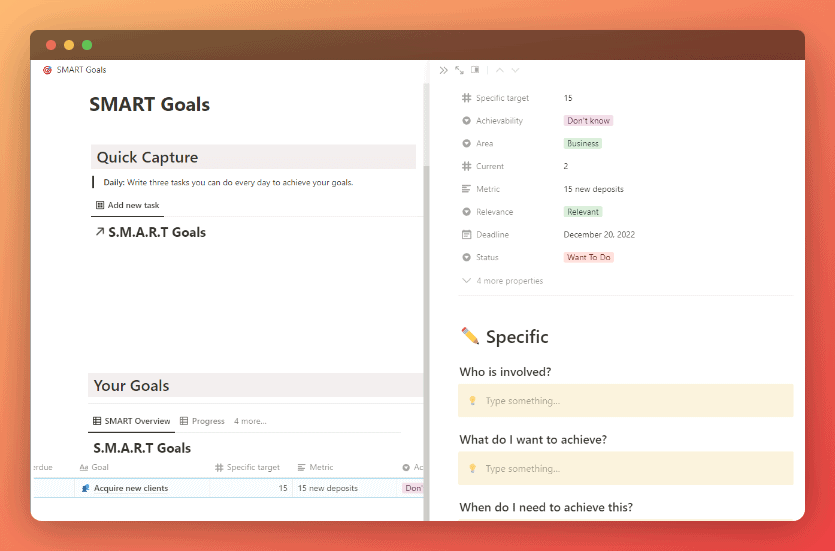Have you ever set a goal for yourself, only to find that you didn't achieve it? This is often because people don't set SMART goals - goals that are specific, measurable, actionable, realistic, and time-bound.
In this blog post, I will discuss what smart goals are and how to set them in order to achieve meaningful targets. Stay tuned - I'm about to help you change the way you think about goal setting!
My "SMART Goals Tracker" (Free Notion Template!)
I've created this SMART Goals planner free Notion template called "SMARTly - Effortless Goal Tracking" that's simple to use but still powerful, it also includes a video guide on how to utilize it.
Why is SMART goal the best method?
SMART goal setting is the best method because it takes all of the guesswork out of goal setting. When your goal is specific, measurable, actionable, realistic, and time-bound, you know exactly what you need to do in order to achieve it. This makes the goal much more likely to be accomplished!
How to Create SMART Objectives
I will use an example goal to work through each of the S.M.A.R.T component.
✏️ Specific
Specific goals are more likely to be achieved than vague ones. Vagueness makes it difficult for anyone else involved in the process, including yourself later on down the line if you decide that your original goal wasn't specific enough or challenging enough after all.
A specific goal answers questions like:
- Who is involved?
- What do I want to achieve?
- When do I need to achieve this?
- Why is this goal important?
Example - before “specific” criteria: “I need more clients.”
Example - after “specific” criteria: “I will acquire new clients.”
📊 Measurable
When you know your goal is measurable, it makes reaching the finish line so much easier.
It's important to start with specificity and then work towards quantifying those goals because only through numbers can we track progress in order for us be able measure whether or not have achieved what was desired when going through this process.
A measurable goal answers questions like:
- How will I measure my progress?
- How will I know if my goal is achieved?
Example - before “measurable” criteria: “I will acquire new clients.”
Example - after “measurable” criteria: “I would like to acquire 15 new clients, and I can measure my progress if 15 new clients have paid invoice / 8 projects launched / 5 new case studies from ideal client published on the website.”
🤔 Achievable
You can't set up a goal that is too high for you or your team. If it's not realistic, then why bother?
A achievable goal answers questions like:
- Will it be clear when the goal is complete?
- Is it reasonable to complete the goal in the time allotted?
Example - before “achievable” criteria: “I would like to acquire 15 new clients.”
Example - after “achievable” criteria: “I would like to acquire 15 new clients, and I can achieve this goal by implementing the paid discovery method and client acquisition formula sales strategy that I've recently learned.”
❓ Relevant
The goal you’re setting is the most important decision that will affect your results. If it doesn't align with what's relevant for you then how can we expect to succeed?
A relevant goal answers questions like:
- Is this goal related to my overall success?
- Is this the right time for me to be working towards this goal?
Example - before “relevant” criteria: “I'd want to acquire 15 new clients, so I'd schedule an hour each day to complete critical tasks.”
Example - after “relevant” criteria: “I would like to acquire 15 new clients, so I will set aside an hour everyday as a high-priority to complete key tasks, as completing this goal will vastly improve the quality of my business and personal life.”
⏳ Time Frame
When you have an idea of what your end goal should be, the next step is to figure out when it will happen. Is this something that can wait? If not then how long do we need for success before moving onto other goals in life or working on them full-time instead would help us reach our final destination faster.
A time-bound goal answers questions like:
- How long it should take to accomplish this goal?
- When will I check in on whether or not the goal has been completed?
- Am I ready to start working on this goal?
Example - before “time-bound” criteria: “I would like to acquire 15 new clients, so I will set aside an hour everyday as a high-priority to complete key tasks.”
Example - after “time-bound” criteria: “I would like to acquire 15 new clients within 6 months, so I will set aside an hour everyday as a high-priority to complete key tasks. I will check my SMART Goals planner every week to make sure I am making progress.”
By specifying, measuring and timing your dreams you can make them a reality.
Aditya Raj Singh
🧠 Conclusion - SMART Goals
The SMART framework is a great way to set goals and attain them. Whether you're looking for something major or just want some easy steps, this system can help!
